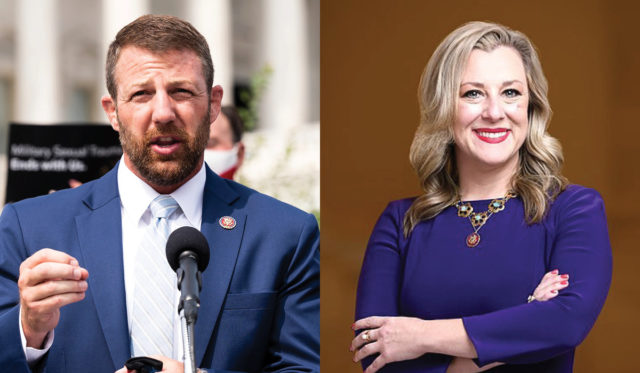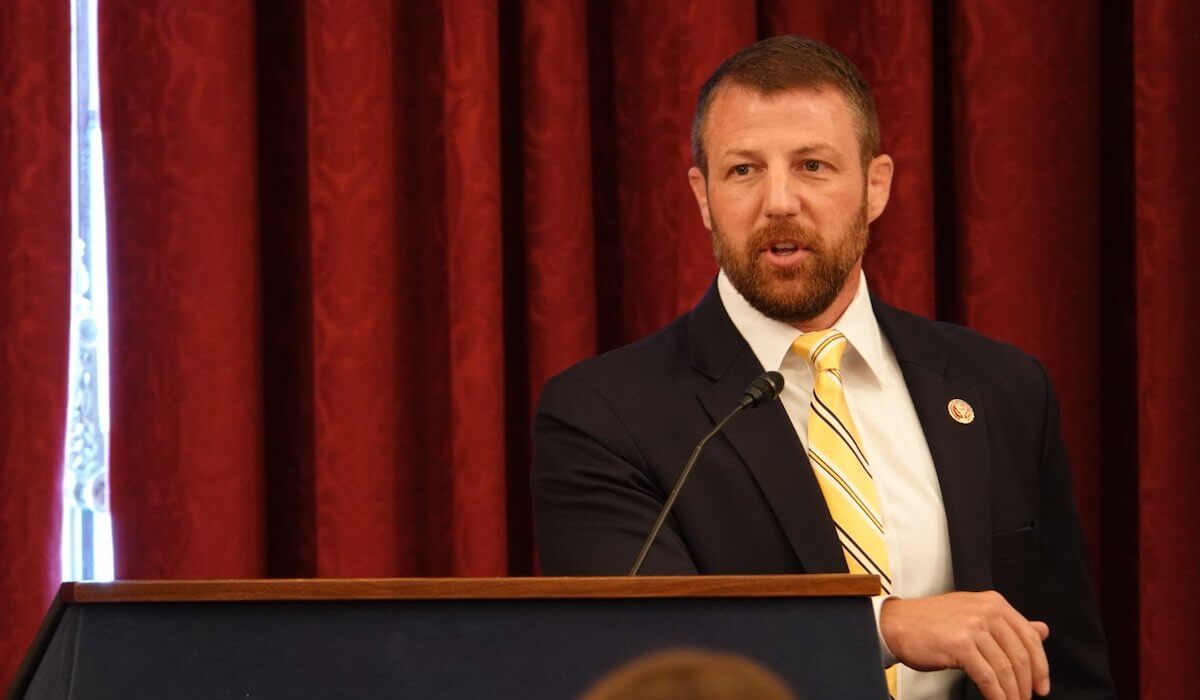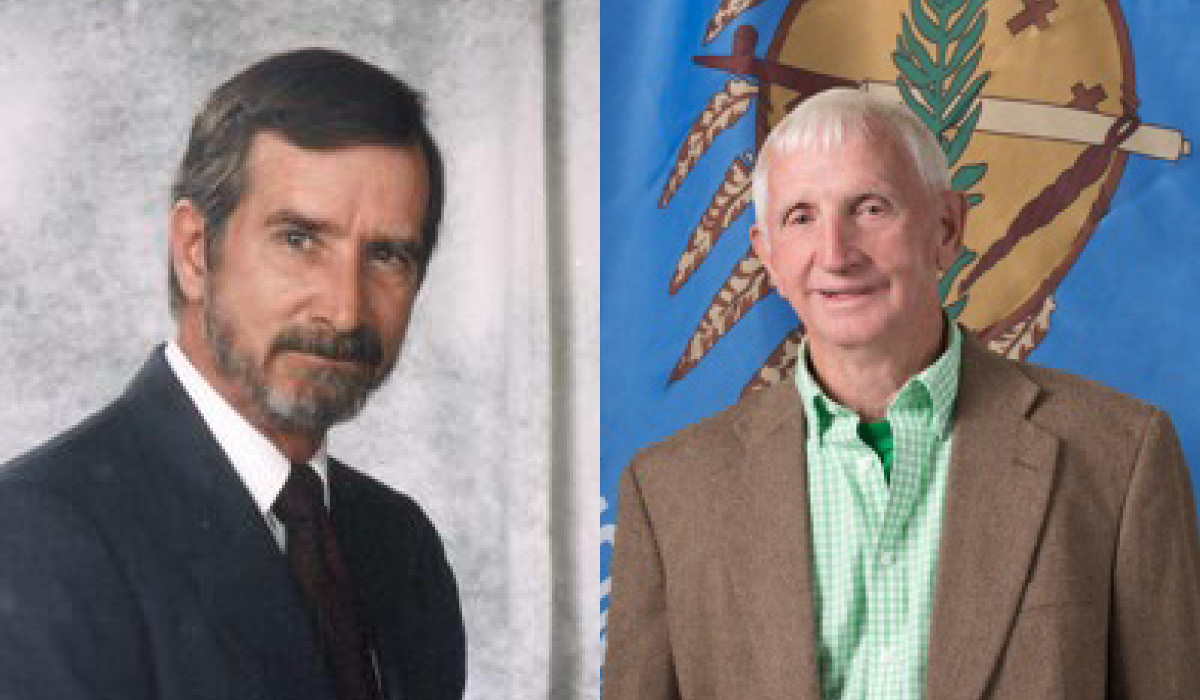

Oklahomans are in the unusual position of deciding two U.S. Senate races this year owing to Sen. Jim Inhofe’s resignation after almost three decades in the seat.
Former congressional colleagues Markwayne Mullin and Kendra Horn are vying to replace him, along with Libertarian candidate Robert Murphy and independent candidate Ray Woods.
Republicans have held both of the state’s U.S. Senate seats since 1994, when Inhofe replaced David Boren, and the latest polls by Amber Integrated and Sooner Poll show Mullin leading by double digits. However, an Ascend Action poll recently showed Horn at 41 percent and Mullin at 47 percent.
Horn, who is running as a moderate Democrat, believes the connections she has built in communities across Oklahoma and her commitment to work across the aisle will help her pull off an upset.
“What I find over and over again is that we have a lot more in common than we have that’s different,” she told NonDoc in a recent interview. “But it takes somebody that’s willing to push back at the extremes on either side and to seek that common ground to get it done.”
Like many Republicans this election cycle, Mullin, whose campaign did not respond to requests for an interview, has been emphasizing national political battles in his pursuit of the open seat.
“Markwayne left college to fight to save his family’s plumbing business,” says the homepage of his campaign website. “In Congress, he fought the liberals trying to stop President Trump. He is a tried-and-true conservative leader who will NEVER BACK DOWN to the D.C. liberal elites.”
The winner of this special election will serve until 2026, when Inhofe’s unfinished term expires.
Horn promises incremental change

Horn has experience flipping seats. In 2018, she defeated incumbent Rep. Steve Russell to win Oklahoma’s 5th Congressional District, which had been in GOP hands for decades. However, she served for only one term after losing to Republican Stephanie Bice in 2020.
Horn said a number of factors contributed to that loss, including COVID-19 restrictions.
“One of the biggest challenges that we faced in 2020 was the limitations on in-person gathering for a period of time, and I think that’s really key in pulling us away from these fringes and the extremism that we are seeing,” she said.
Before entering politics herself, Horn, an attorney who was born in Chickasha, worked as press secretary for Democratic Congressman Brad Carson and ran the 2014 gubernatorial campaign of Joe Dorman. She helped found Women Lead Oklahoma, a nonprofit that trains women to become civic leaders, and she served as the director of Sally’s list, which works to elect progressive women in Oklahoma.
During her time in Washington, Horn sat on the House Armed Services Committee, and many of the bills she introduced or co-sponsored dealt with military and veterans’ issues. She cites legislation she worked on to improve housing at Tinker Air Force Base and other military bases as one of her most notable achievements and as an example of her belief in bipartisan cooperation and incremental change.
“There’s a lot of places where we get people promising magical solutions, silver bullets, like magic pixie dust or whatever — that we’re going to just change things like that,” she said. “Like, Why can’t you fix this overnight? And the truth is, the problems that we’re facing are incredibly complex, and they’re challenging.”
Horn has been critical of federal Democratic leadership, calling Senate Majority Leader Chuck Schumer “out of touch.” She points to energy policy as an area where she differs from her party, which she describes as pursuing an “electrify everything” approach. Though she said she believes coal should be phased out as an energy source, she thinks the U.S. should plan to continue using oil and gas along with renewables and that leaders should be looking at increasing fuel efficiency and pursuing measures such as carbon capture and enhanced oil recovery to reduce environmental impacts.
“We need a comprehensive national energy policy that ensures we have abundant, affordable, reliable domestic sources of energy and simultaneously is concerned about the environment and our future,” she said. “But we need a realistic strategy to get us there.”
On abortion, Horn said she doesn’t support “unlimited” abortion at any point of pregnancy, but she favors codifying the rights that had been established by Roe v. Wade, which she called “a good standard.”
She said she supports federal decriminalization of marijuana, an issue the Biden administration has said it plans to pursue. She plans to vote for State Question 820, which would legalize medical marijuana in Oklahoma and will go before voters in March 2023.
On filibuster reform, she is noncommittal, saying that if Democrats would run incremental, focused legislation instead of what she calls “giant Christmas tree bills” that are ideologically driven, the filibuster would not be such an important issue.
“I think conversations around the filibuster are a distraction from the conversations that we need to have around what changes we need to make,” she said.
Asked what issue she would address if she had the ability to wave a magic wand and pass legislation, she said she would focus on getting dark money out of politics and doing away with gerrymandering.
Financial transparency is one area where she draws a distinction between herself and her opponent, mentioning instances where Mullin was found to be in violation of campaign finance and ethics rules. She also noted that Mullin’s family company received more than $1 million in Paycheck Protection loans, even though he voted against expanding the program and requiring transparency about the money distributed.
“At every turn, if he can help himself, he does, and then he turns around and turns his back on the needs of Oklahomans,” she said. “Part of the problem that we have, and this is from both sides, is people that think that their oath and their allegiance is to a party or a person and not to our state in our nation.”
Horn says she would value her oath to protect and defend the U.S. Constitution and Oklahomans.
“We need people that are going to show up at service, not people that are just more interested in gaining control and power,” she said. “And that probably is the underlying fundamental difference between us.”
Mullin touts support for and from Trump

Mullin has represented Oklahoma’s 2nd Congressional District since 2012, when Democrat Dan Boren left the seat. During his first campaign, Mullin promised not to serve for more than three terms, but voters didn’t seem to mind much when he broke that pledge. He is now finishing his fifth term, and he won reelection handily every time.
Before entering politics, Mullin ran his family’s plumbing business, hosted a home-improvement talk show, and had a short career as a mixed martial arts fighter. After graduating from high school in the small town of Stilwell, he attended Missouri Valley College on a wrestling scholarship, but later dropped out to take over Mullin Plumbing. He completed an associate’s degree in construction technology from OSU Institute of Technology.
Mullin and his family currently own a number of companies, including Mullin Plumbing, from which Mullin made more than $5 million in capital gains and business income in 2021, according to his House financial disclosures.
Mullin has cited his wealth as evidence that being in Congress is “a service for me, not a career,” as he told a group of voters in 2017.
At that same appearance, he objected to the idea that Oklahomans pay his $174,000 congressional salary.
“That’s bullcrap. I pay for myself,” Mullin said. “I paid enough taxes before I got here and continue to, through my company, to pay my own salary.”
Mullin currently serves on the House Committee on Energy and Commerce and on the Permanent Select Committee on Intelligence. The legislation he sponsored in the most recent congressional session include a number of bills to prohibit mask mandates, a bill to classify late-term abortion as murder, resolutions to expunge the impeachment of President Donald Trump, and bills related to broadband and cable service.
Mullin is a Cherokee citizen and one of only a handful of native lawmakers in Washington. He has said he “didn’t know there was anything special about being Cherokee” until he entered Congress and started hearing from native constituents. Over the years, he has begun working on various issues that touch Indian Country, such as advocating for funding for Indian Health Services or authoring a law that would require the FEC to track and report on scams targeting tribal citizens.
His record is by no means uncontroversial among tribal citizens, but after the McGirt decision, which Gov. Kevin Stitt and some Oklahoman Republicans have criticized, Mullin released a joint statement with tribal leaders acknowledging tribal sovereignty.
Mullin has built much of his Senate campaign around his support of Trump, who has endorsed him in the race.
Mullin’s campaign website says he is is “100% pro-life” and has said he would support legislation to ban abortion nationally without any exceptions.
On marijuana policy, Mullin has said he is opposed to descheduling the drug, and he opposed the legalization of medical marijuana in the state.
In the past couple of years, Mullin has attracted media attention for non-legislative actions. During the riots at the U.S. Capitol on Jan. 6, Mullin helped barricade the House chamber and tried to reason with the intruders. (Mullin has said that he believes the 2020 election was stolen from Trump.)
Then, in 2021, at the U.S. military withdrew from Afghanistan, Mullin tried to travel to the country, against warning by the State Department, to try to help with evacuation efforts. He reportedly threatened staff at the U.S. embassy in Tajikistan when they would not help him get into Afghanistan with large amounts of money, in violation of local laws.
Mullin has referenced the ordeal in his recent campaign advertisements, saying he decided to “get in the fight.”
The third-party candidates

Libertarian candidate Robert Murphy has run for office in Oklahoma several times before. He is a Marine veteran, worked as a carpenter in Tulsa for a time, and has been employed as a data technician at the University of Oklahoma. He is now retired.
On his campaign website, Murphy says the country needs “a Libertarian revolution through the ballot box.”
“Our freedoms are being limited and eroded in many ways,” his website states. “Medical mandates, the war on drugs, the war on guns, the war on terror, internet censorship, NSA eavesdropping, debasement of our currency, enormous debt, frivolous military actions to protect or promote international corporations — all these things reduce our freedom of action.”
Murphy is against government intervention in business and in favor of legalizing drugs and abortion.
Ray Woods is running as an independent candidate. A military veteran, Woods is 87 years old and is running for office for the second time.
His campaign website lays out his plan to “reboot the Constitution.”
“Ray Woods a common independent man with no agenda except to amend and reboot the Constitution of the United States of America,” the website says. “After 240 years the federal bureaucracy, which this Constitution has created, has usurped the solvency of the sovereign states and diluted the freedom and liberty of every citizen within this mighty federal superpower.”
His website says he wants to put education and health care under state control, allow states to institute currencies backed by gold and silver, and “dissolve and make inoperative a military industrial complex.” His website also dips into anti-Semitic conspiracy theories, saying he wants to free the monetary system from “the Federal Reserve Jewish oligarchy banking cartel.”
Woods has called himself the founder of “tetranometry” (described on his LinkedIn page as “4D geometry”) and “freeology.” Links from his website offer a visually maximalist guide to these ideas.




















